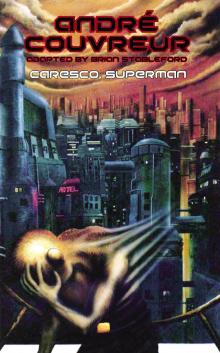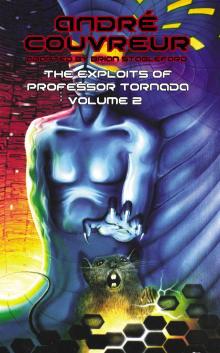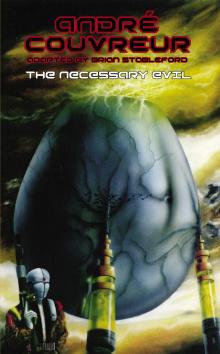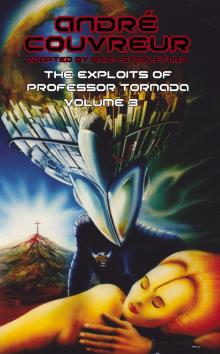- Home
- André Couvreur
Caresco, Superman Page 9
Caresco, Superman Read online
Page 9
In any case, the anxiety of being separated from Marcel scarcely encouraged him to distract himself. Then again, the profound bed was tempting. He did not even have to undress to lie down on it.
Before going to sleep, he considered insistently a little work of art hanging from a concave wall, just above the level of his horizontal position, in the place where pious individuals in his homeland displayed the lamentations of a Christ, the emblem of their duties, their dolorous dreams and their tormented passage through life. Here, that symbol had been replaced by an entwined naked couple, with genuine flesh tones. He stared at it for some time.
Soon, however, snores echoes by the sonority of the room attested that he was no longer contemplating that attribute of the new religion.
CHAPTER VI
The next morning, Choumaque woke up late. He had slept solidly for a time that he estimated at twelve hours, and he experienced as a result a very particular sentiment of bliss, a relaxation of his limbs and a clarity of heart such as he had never known.
Although the arched bay window giving access to the terrace was closed, a current of air impregnated with the scent of lilacs was circulating in the room, and it was doubtless that perfumed caress that had extracted him so agreeably from sleep. The savor of those first moments pleased him. He wanted to stay there, lounging lazily in the softness of the delicately feathered bed, his mind completely modified. Charming ideas, memories of the past and hopes for the future, delighted his idleness.
By way of contrast, he remembered the trouble had had experienced, only a fortnight before, in shaking off the gross idleness of the morning, subjecting himself to the contact of cold water and, after having dressed dolorously, quitting his little apartment decorated with engravings and trinkets dear to his contemplation if not his purse, to go and philosophize with the dunces.
Here, nothing was similar. Although the walls were not charged with prints and mock-Tanagra figurines, at least they were garnished with a pale pink paste, in harmonious contrast with the red of the cushions supporting his head, and the violet of the bath-robe he had retained during sleep. The absence of angles in the corners permitted him to breathe without fear of the dust that ferries diseases. He knew that if the whim took him to plunge himself in the basin, the water would be warm and odorous. He did not even have to soap himself or scrub himself, for the machine would take care of that task.
Although the privation of his milky coffee tormented him slightly, he reassured himself with the thought that an aliment less harmful to the occasional palpitations experienced by his heart would replace it. The pipe that he lit every morning had the same unfortunate effect on his organism, and he consoled himself for no longer having it within arm’s reach, on the nearby table. The rotundity of his belly described, beneath the covers, a projection whose esthetic faults he deplored.
He was disposed thus, with his eyes turned toward the door, when the same resonator that had announced Dr. Hymen’s visit the previous evening informed him of the entry of another unknown individual.
“The High Priest Marjah!”
The door rotated gently on its hinges, and a man appeared, his arms extended in front of him. He was of medium height and his silhouette was harmonious. His yellow costume, admirably becoming, seemed to have been inspired by Byzantine grace and also by respect for the laws of hygiene. A doublet of flexible silk, ornamented by little holes that were as many vents designed to facilitate the circulation of air, while letting out the neck and embracing the torso, fell away from the black velvet belt like the flaps of a Roman tunic, stopping at the knees. His legs described their contours in tights made of the same fabric, stretched at the kneecaps, and covered on the feet by black sandals. Beneath the waist, two embroidered red crosses signified hierarchy.
Abundant brown hair evaporated as far as the shoulders in long contrived undulations, and artifice was similarly detectable in the make-up of the face, with a narrow nose, delicate features, too young and too pretty, contrasting with the antiquity of the gaze.
He was followed by Mirror-of-Smiles, similarly dressed, but with a single red stripe on the front. The child’s arms were laden with a vestment.
“May Caresco operate upon you! Here you are, already awake, my dear Choumaque,” he said, as if he had known his interlocutor for a long time. And, without paying any attention to his surprise, he added: “I see with pleasure that you’re in good form to be subjected to a few modifications.”
“I’m ready for anything,” the philosopher replied. “Principally, to know what important individual I’m talking to at present.”
“I’m not an important individual, my dear Choumaque. I am, on the contrary, one of the humblest servants of the Superman. I’m Marjah, former favorite of the Shah of Persia, presently a eunuch, and until the end of my days, if it pleases Caresco, High Priest of Gitons and Director of Slaves.”
“That’s an important responsibility,” said Choumaque, emphatically.
“It has brought me to you this morning, to discover whether you have been content with Mirror-of-Smiles.”
“My God! I haven’t had anything much to demand of the child…”
“I regret that, my dear Choumaque, for the little one will not have much longer to allow himself to be cherished. He’ll soon be mutating into a slave.”
“He told me that yesterday, and I couldn’t help feeling sorry for him.”
“Feeling sorry for him? Why?” Marjah deposited violet garments at the foot of the bed. “Those will serve you later, my dear Choumaque. For the moment, you’re going to follow me to the Palace of Surgery, where you’ll spend three hours—the time necessary for your metamorphosis.”
“What’s going to be done to me? Am I going to undergo an operation?”
“You’re going to undergo a dozen.”
“But I’m not ready! I wasn’t expecting that! You can’t surprise people like that when they’ve just woken up! Has my friend Marcel Girard been informed? And my traveling companion, Miss Mary Hardisson?”
“Don’t worry about them. They’ll be able to do without you for three hours. Their youth and beauty spare them such annoyances for the time being, but you have to be completely remade.”
“Damn! I wasn’t expecting that!” Choumaque repeated, shivering in terror, all the more so because, at that moment, he remembered the surgical epic of the airplane captain, and saw once again his little half-body perched on the wheeled pedestal. Was he about to be butchered in a similar fashion, and cut back to the organs deemed to be essential? In vain he told himself that an arm, a leg, a liver, a spleen and so on were very minor matters for a Sage; he could not help trembling.
Marjah looked at him, smiling, seemingly amused by his emotion.
“Truly, my dear Choumaque, you’re getting very excited over a little formality. It’s unworthy of an intelligence like yours. To judge by Dr. Hymen’s report, which I read surreptitiously with the sole aim of reassuring you, at the very most, your abdomen is going to be opened to remove the fat; your breast will be split in order to resect parts of the lung that aren’t working well; the varicose veins will be removed from your legs and scrotum; your tibias will be broken in order to straighten then; your teeth will be cleared out in order that new ones can be planted; and the ducts of your liver and bladder that have calculi injurious to their efficient functioning will be cleaned out…trivia, in a word! They’ll finish, I think, by scalping you in order to replace your obsolete hair by a more abundant provision. You’ll wake up young, almost charming, vivified by the various serums with which your tissues will have been nourished. And you’re trembling over so little, my dear Choumaque!”
“Chloroform! I’m afraid of the chloroform.”
“Chloroform! What an outdated terror! Chloroform is no longer in use here. It has been replaced by magnetic influences that will cradle you in the sweetest dreams. Let’s go! Get up bravely, my dear Choumaque, and follow me.”
Confronted by that fine confidence, the philos
opher recovered his courage. In any case, he had no relatives on whom to cast the pretext of grief, and the only friend dear to his heart, Marcel, would be unaware of the unpleasant ordeal.
Marjah recommended that he not get dressed, but simply to retain the bath-robe that he had kept on all night, and only to put on a pair of sandals that he handed to him.
They left the room. As they crossed the landing, before setting foot on the elevator, which was awaiting their embarkation, the philosopher scanned the vast gallery with a rapid glance. He was secretly desirous of seeing his pupil—but the corridor was deserted, the doors closed.
The descent was completed in the blink of an eye, the entire mass sinking down silently, causing the same successions of light and darkness to pass before his eyes, so rapidly this time that the images hardly had time to form. At the bottom, Mirror-of-Smiles pirouetted, and then went away.
Choumaque was glad to get out of the caravanserai, to breathe the warm air, gently perfumed with the aroma of lilacs, like that of his room. The sight of the tall trees, the verdure, the lakes, the polychromatic thickets, and even the flower-beds depicting the unmentionable parts of the body, made him feel better. He wanted to see them later, in company with Marcel, and also Madame Môme. Provided, great God, that the surgeon did not dispossess him of that which he could make agreeable to the latter!
He attempted to interrogate his guide, to obtain fuller information, to discover whether Caresco would be modifying his body in person, but Marjah, after so much prolixity, no longer made any reply.
They went through the strange Palace of the Head, where the little salivary cascades were foaming along the red walls, under the irradiation of enormous columns in the form of teeth. Then there was the exit along the path of fine sand and the reintroduction into the tunnel and into the tube, where the two of them took their places.
“A hundred kilometers—two minutes!” Marjah pronounced, pressing a button that lowered the partition and provoked a formidable thrust of atmospheric pressure on the capsule launched into the void.
This time, Choumaque did not experience any nausea, probably because his stomach was empty. He had sat down on the banquette in order to pass the brief interval of the journey, and admired the comfort of the cabin, the caprice of the black arabesques snaking over the gilded wood. He recalled the recent presence of the two charming bodies of Carabella and Mirror-of-Smiles on the soft divan, and their weary attitude. Those curious memories provided a diversion. In any case, the constant tranquility of Marjah reassured him. The eunuch’s serious, aged gaze contrasted with the apparent delicacy of his body.
“Are you happy here, High Priest?”
“Certainly, my dear Choumaque.”
The expression of the voice belied that affirmation. The philosopher was convinced that, if the man was not unhappy, he did not know absolute happiness either. That opinion had already formed in the wake of a response that Madame Môme had made to a similar interrogation. Happiness! Could they know the price of it, those who knew so many comforts and pleasures? But that was only a passing reflection, quickly interrupted by the stopping of the locomotive engine.
Marjah asked him once again to follow him.
As they came out of the subterranean passage, Choumaque thought that he must be in the region specially reserved to the Superman. He was not mistaken, and the accuracy of his reflection was corroborated by a comment from his guide: “The Brain!”
The monument that was presented to their eyes resembled a vast dome, gray in color, set on the ground. Its ovoid form, the broader extremity directed backwards and the sides flattened, was divided by a large dark fissure separating two hemispheres symmetrically furrowed by numerous juxtaposed meanders, uncovering anfractuosities. The red stripes of a vascular system were the sole decoration of the uniformly dull, severe and disquieting mass, which reminded Choumaque of the nausea once provoked by the menu of his eatery when the latter displayed at the head of a long list of denominations as alluring as they were unfamiliar: Fried brains in Bechamel sauce.
That impression soon dissipated, however, when he had passed through the little opening in the median fosse, which gave access to the interior of the palace. The strict order of the vast circular translucent halls of glass, supported by metal lattices, all ablaze with omnial light, gave him the impression that he was penetrating into active Thought, into the cerebral force acquired to the benefit of humankind.
Thanks to the transparency of the walls, he saw people clad in violet smocks working feverishly, agitating in front of machines with complicated components, whose gears were propagating mysterious impulses, lifting enormous levers, crushing and molding metals, always silently, by the simple pressure of contact. Elsewhere, sparking furnaces, licking flames and infinitely varies colors—an entire living alchemy—aureoled the ponderous gestures of grave individuals whose gazes, fixed upon books, calculations, blackboards, test-tubes, microscopes and other complicated instruments, pale silver gleams and golden flames, paid no attention to the passing strangers.
Choumaque noticed once again the antiquity of their souls, belying the usurped youth of their bodies. There were no other sounds than those of toil, the clicking of metals, the muffled rhythm of pistons and the release of valves: a colossal effort produced by the omnial fluid, which a view to giving birth to omnium.
Choumaque and Marjah continued on their way, walking over brightly-colored spongy fabrics that stifled their footfalls. In the meantime, on the frontispieces over the doors, allegories depicted the studies of the people who worked there. In one there was a map of the world, and soils were being analyzed; in another there was a celestial sphere, and the stars were being interrogated. Further on, the ritual burial of microbes advertised the beneficence of serums. Elsewhere, the study was symbolized by a fresco in which the form of a smiling naked woman brandished a torch from which an apotheosis of concentric flashes sprang, and it was deducible that the fluids of Force, unknown energies, light, heat and electricity—all transformations of the unique power—were within.
They continued, Marjah pushing the neophyte, who had a tendency to pause and contemplate. Finally, after turning many more corners, and many astonishments before innumerable halls in which the same labor concentrated the minds of scientists, they emerged, and immediately found themselves in front of another palace even more marvelous than those that had already been presented to Choumaque’s admiration.
“The Temple of Surgery—the residence of the Superman!” announced the eunuch, with pious respect, kneeling down.
Choumaque understood that he ought to imitate him, and he prostrated himself. That movement, and the respite of adoration, that followed it permitted him to contemplate the monument, the mass of which astounded him, as much by its bizarrerie as its richness. It would have been difficult to recognize any style or form whatsoever in the incoherence of the projections and reinforcements that constituted the structure. On looking more closely, however, one might have thought it a heap of gigantic surgical instruments hurled on top of one another pell-mell, sealed together by a mortar itself composed of an infinite number of tiny implements enameled with precious stones—rubies, sapphires, diamonds, emeralds, peals and topazes—and arranged like jewels in a mosaic.
In that essential paste, the debris of bones and entire bones—tibias, femurs phalanges and skulls—jutted out in places; maxillas and cheekbones stood out from the wall, designing a rictus; thoracic cavities, fixed in the massif, underwent minuscule inflations proportionate to the enormity of the block.
The sight would have been terrifying if the sunlight striking those slender objects, metals and gems had not dispensed a radiant and savage gaiety. What surprised Choumaque even more, however, was the entrance to that extraordinary construction. It was constituted by the reproduction, scaled up to twenty meters, of an instrument that had been modified at the beginning of the twentieth century to such a point of surgical artistry that all the operators in the world, frightened by the geni
us of its complication, had refused to employ it, leaving its usage solely to its inventor, Caresco.
By means of its strange mechanism, that implement, once a wound was produced by a scalpel, parted the flesh without wounding it, uncovering and removing almost by itself the organs or tumors that the mission was to extract, ligatured blood vessels, resected limbs, cleaned joints, broke bones and opened the most resistant skulls, and then, when the operation was concluded, reunited the tissues almost without leaving any trace.
The Superman’s masterpiece, it had facilitated improbable successes for him. It had been the ideal mechanism to aid his formidable audacity and his scorn for lives. It affected the form of an iron horseshoe capable of widening or contracting at will by means of simple pressure exerted within its rim. According to the caprice of the hand manipulating it, it became simultaneously a crusher, an aspirator, a rectifier, a separator, a speculum, a curette, an osteoclast, scissors, a washer, an amygdalatome, a suturer, a trocar and an enterotome; it sufficed for all the necessities of urgency or slowness; it replaced everything that experience had taken centuries to acquire.
Thanks to that dispositive, Caresco had been able to operate on two hundred patients wounded in a single night after the famous Battle of New York in 1920, which had put an end to the Anglo-American War, in which his thirst for fame had led him to volunteer, and the reportage of the two worlds had obligingly celebrated that feat, unprecedented in the annals of medicine, and lauded the employment of the Carescoclast, a name made up of anagrams of the device’s uses.

 Caresco, Superman
Caresco, Superman The Exploits of Professor Tornada (Vol. 2)
The Exploits of Professor Tornada (Vol. 2) The Necessary Evil
The Necessary Evil The Exploits of Professor Tornada (Vol. 3)
The Exploits of Professor Tornada (Vol. 3)